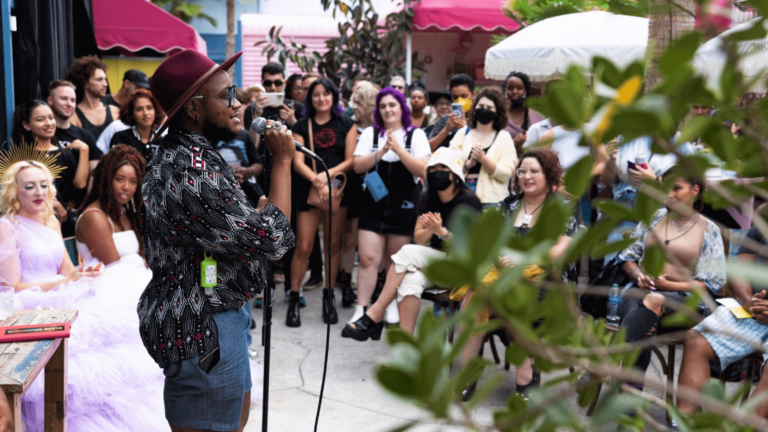Marketing a conference means being everywhere at once. You want the professional world abuzz with anticipation, with your event’s name popping up everywhere they turn.
“You’re going to be at [insert your event name here], right? Seems like everyone is!”
That sort of cultural infiltration takes more than basic social and web presence. Especially if you’re still building your conference brand, you have to infuse your marketing with extra oomph.
Plus, the conference and exhibition industry expects to grow to $36.31 billion by 2026. That’s good news for attendance potential, but you’ll need to work even harder to make your events stand out from the crowd.
After more than 15 years of helping organizers run events all over the world, we’ve learned what works and what doesn’t when it comes to conference marketing.
This comprehensive guide will help you prepare for your most successful event yet. Let’s get started.
Table of Contents
Optimize social media promotion strategy
Paint a picture of success, networking, and career advancement
Invest in paid ads (and monitor performance closely)
Refresh your SEO efforts for 2024
Create content you can repurpose across channels
Optimize your email marketing efforts
Engage closely with event sponsors and speakers
Treat your attendees as marketing partners
Stay top-of-mind for event-goers
Remove all barriers to registration

Know who your attendees are
Identifying your target audience is the first step in determining how to effectively market a conference. Figure out which demographic groups would be most interested in attending your conference, and research the best channels to market your event to them.
Simple age-based demographic data is a great place to start. For example, millennials are the largest demographic group in the United States, with over 72 million people. Aged 27–42 (as of 2023), they are an ideal target for most types of conferences.
With that said, don’t overlook the growing importance of Gen Z, whose oldest members are now in their mid-20s.
Demographics influence your marketing strategy, as they determine what platforms you should use to promote your event. LinkedIn is very popular among professional millennials, as the biggest age group on the platform is 30–39. However, TikTok, where the biggest age group is 18–24, reigns supreme among Gen Z’s.
Aside from age, you should also consider your target audience’s complementary interests, educational background, and many other factors when finding your audience.
Eventbrite’s data analytics tools help you to find your people. With 90 million unique ticket-buyers, Eventbrite is the largest event organization platform — and our tools enable event hosts to find information on who has attended similar events (lookalike audiences) to refine demographic data and targeting strategies.
Optimize social media promotion strategy
Did you know that nearly 25% of all traffic to registration pages comes from social media? People turn to social media to find out what’s going on and why they should join in.
As a conference promoter, your presence must be strong across social channels, and you need to focus your promotion on channels where your target audience spends time.
Some best practices for marketing a conference on social media include:
- Connect with influencers, conference speakers, and sponsors to help build excitement for your event
- Modify your strategy for each social media channel — what works on LinkedIn might not work as well on Facebook
- Don’t share only promotional content — use social media to build a brand, too
- Run contests and encourage sharing to boost engagement
Promoting your event on social media can involve both organic posts and advertisements. Have fun with your content; it should be an extension of your brand.
Create a catchy event hashtag
The humble #hashtag isn’t going anywhere. In fact, it’s more relevant than ever, as most social media platforms have now adopted it (hashtags were originally only in use on Twitter, now X).
Event hashtags can be powerful tools for conference creators. They’re key to building a buzz and increasing your chances of online exposure.
During your conference planning process, you should come up with a catchy, short, and memorable hashtag for your conference. Something like #[acronym][year] works well — for instance, #ACE2024, or #WSF24.
Then, start using it in all your related social media posts and promotions. You can also encourage speakers, sponsors, and attendees to use it to further grow exposure.
You can even directly encourage people to use the hashtag by running promotions, contests, or giveaways.
With that said, as the event grows closer (and particularly once the conference has started), you should keep an eye out for “unofficial” hashtags that might be catching on.

Paint a picture of success, networking, and career advancement
There are many reasons to attend a conference, but a chief reason for many is the networking opportunities it presents.
Conferences have always been a great place to network with other industry professionals or even just people who share similar interests. In particular, 73% of Gen Z attendees said that career and networking opportunities were the most interesting factor at conferences.
So, while you want to promote the wonderful speakers and programming, you’ll also want to paint a picture of the networking and career advancement opportunities at your event.
You can do this, for instance, through storytelling about a connection made at a previous conference you hosted — but also through your event programming. For example, by building in more space in your event schedule for a “cocktail hour”, “welcome reception,” or even just “networking time.”
You can even use the prospect of networking as part of your conference pricing strategy. You could host a VIP lounge with comfortable seats and an open bar, making access to the lounge exclusive for VIP pass holders.
Take Powerteam International as an example — an Eventbrite creator who uses a VIP pricing strategy to deliver more value to attendees and increase revenue at their popular education and wealth-building conferences.
Even virtual conferences can include networking opportunities, so don’t miss out on this potential just because you’re planning a virtual event.
Invest in paid ads (and monitor performance closely)
A marketing plan for conferences should include a budget for paid ads, which can help you connect with your target audience. Fortunately, most platforms allow you to test the waters with small budgets.
You can use many outlets to invest in paid ads for your conference. Some key platforms include:
Social media platforms: Social platforms allow you to target your ads using a huge amount of user data, and most platforms have a small minimum budget (Facebook ads start at $1/day).
Eventbrite: We help creators to organize conferences, sell tickets, and communicate with attendees. Eventbrite Ads allow you to get your event in front of millions of active event-goers in a simple and cost-effective way. Eventbrite lets you monitor ad campaigns and reallocate budgets to the audience segments that are driving the most engagement — automatically.
Reddit: Reddit ads are unique because you can target niche micro-communities that may be interested in your event.
Google: Google Ads help your event signup landing pages show up in more Google searches — and you can also use Google to pay for display ads on millions of related websites.
Whatever platforms you choose to use, make sure to monitor your results closely and tweak your strategy to ensure you drive the results you want to see.
Utilize the right technology
Using the right technology to plan, host, and promote your event can go a long way toward making your conference a success.
With robust tools for planning, marketing, ticketing, promotions, data analytics, and more, Eventbrite provides a centralized platform for your entire conference management efforts. That’s why it’s the leading all-in-one platform for event organizers.
Event creator and entrepreneur Katie Saffert utilizes Eventbrite to host her women’s entrepreneurial events. “The ease of having the back-end and tech done for us — and then also being able to easily send emails out to our attendees — has been such a huge tool for us.”
As Katie learned first-hand, using a tool like Eventbrite helps save both time and money. Everything is in one place, and it’s all customized to make your experience as simple as possible. Our community has hosted millions of events on the Eventbrite platform, and we’ve learned a lot about what makes events successful.
Use data insights to market your conference.

Refresh your SEO efforts for 2024
Search engine optimization (SEO) is a science and a constantly changing one at that. It involves using strategically placed keywords in your web copy, mentioning key factors like your event’s details, and, of course, having great content to begin with.
One big challenge for event organizers is that events are time-limited by nature. SEO takes time, and getting an event page to rank well, quickly, is difficult.
Hosting your conference on Eventbrite could give you a leg-up in SERPs (search engine results pages), thanks to Eventbrite’s SEO tools and website authority. Pages on Eventbrite “piggyback” off Eventbrite’s existing page authority ratings, making those pages rank more quickly in Google Search.
Plus, using Eventbrite allows you to showcase your event in front of millions of people actively searching for events.
Create content you can repurpose across channels
Your content includes every single digital marketing asset you produce, from photographs to witty captions to live video to insightful copy. But if you’re creating content from scratch each time you post something, you’re wasting precious time.
Repurposing content doesn’t just mean sharing the same thing across every channel. It’s about imaginative repackaging for targeted use.
For instance, extract the most valuable information from your conference presentations into infographics to share via email and social media. Or share prime quotes from keynotes on Twitter, tagging the speaker along with your event’s custom hashtag. Then, collect all these quotes into a “best insights that came out of this conference” blog post.
These days, you can also use AI tools like ChatGPT and Jasper AI to repurpose content without much manual effort on your part. For example, you could easily use an AI tool to create an email newsletter based on your existing blog content.
Optimize your email marketing efforts
Email is still very powerful in 2024, and it’s certainly vital to conference marketing.
Optimizing your email marketing efforts starts with segmenting your lists. Rather than blast your entire list, break it down into buckets such as:
- Those who attended last year
- Those who’ve signed up for the next event but have not yet attended
- Those who’ve expressed interest but have not yet registered
You can then send targeted emails with messaging designed specifically for each type, and combine this effort with what you know about demographics.
And when the conference draws closer, don’t forget to send event reminder emails. At Eventbrite, we use integrations with Mailchimp and offer an email marketing platform for events to assist with email marketing automation tools to help you sell more tickets and connect with your audience.

Engage closely with event sponsors and speakers
Your sponsors and speakers can be huge advocates for your event and help drive a significant number of registrations.
To maximize this potential, it helps to provide resources, media assets, and guidance to your stakeholders well ahead of the conference so they have adequate time to promote your event.
This could mean sharing promotional images, flyers, or social reels. You could also use exclusive promo codes to drive greater conversions. For instance, you could offer a 10% discount for employees of the keynote speaker’s company.
Treat your attendees as marketing partners
Word of mouth is a powerful, age-old marketing strategy. Today, you can influence this strategy more than ever before by leveraging social media and influencer management tech.
SocialLadder and Verve are two that help you build brand ambassador programs from among your existing registrants. With promo codes, custom websites, and rewards programs, you can motivate ambassadors to promote and register more attendees for your conference.
Stay top-of-mind for event-goers
With all the ways people may hear about your conference, it’s hard to predict which touchpoint will lead them to convert to a registered attendee. It’s not uncommon for people to ponder a commitment for a while before they press the button.
Ad retargeting is when you pay to advertise directly to someone who has already shown an interest in your event. By reaching potential attendees across the web, you remind them of their intention to sign up for your conference and stay top-of-mind. The average event sees a 6x return on retargeting efforts (meaning retargeting produced $6 in revenue for each $1 spent on ads), so this tactic is huge for measurable ROI.
Remove all barriers to registration
Studies show that the more steps people have to take to go through a checkout process, the less likely it is that they’ll get to the finish line. Make it easy for attendees to register from any site where they might discover your event.
For instance — if a prospect is on Facebook at the time they decide to register, give them the ability to buy right on Facebook. A robust event management solution will have partnerships with the most important discovery sites to enable native checkout.
You should also strive to make checkout pages and all your online content accessible to everyone. That means following web accessibility standards on your own website and product pages or using platforms like Eventbrite that already enact these standards.
Make your next conference the most successful yet!
Make your next conference marketing event the best one yet with these actionable conference marketing tips. Whether you measure success in raw attendance numbers, ROI, or any other metric, these strategies can help to improve outcomes.
Want to learn more about promoting events? The Eventbrite Event Marketing blog offers dozens of actionable guides on everything you need to know about event promotion.






